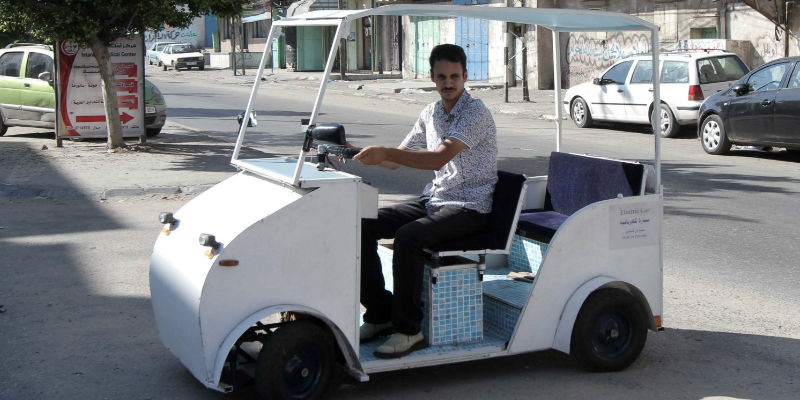
Palestinian taxi driver, Munther al Qasas, drives his electric car in the streets of Gaza City on August 9, 2012. Qasas made the electric car over several months on the rooftop of his house as Gaza was hit by its worst fuel crisis in living memory. AFP PHOTO/ SAID KHATIB
GAZA CITY — The boxy little white and blue vehicle draws plenty of curious stares as it chugs down the street. But this is no golf cart — it’s Gaza’s first hand-built electric car.
It is the latest creation of Munther al-Qassas, a 32-year-old taxi driver from Gaza City who was looking for a novel way to get around as the tiny Palestinian enclave goes through its worst fuel crisis yet.
“I thought about making a car which would suit our circumstances in Gaza, especially with the fuel crisis that forces people to stand in line for hours outside petrol stations or pay a huge amount of money” on the black market, he told AFP.
Not only is it environmentally sound but the tiny white vehicle, which has no doors and can carry two passengers at the back, has been entirely crafted out of recycled materials.
Qassas says it took him several months to build the car in a workshop on the roof of his home where he collects old electronic gadgets.
With a frame made entirely out of wood and with tyres taken off an old wheelbarrow, the little vehicle is hardly a speed demon — managing just 20 kilometres an hour (12 mph) at full throttle.
Contrasting with its white exterior, it has a pale blue roof and similar-coloured interior, and a recycled piece of gym kit for a steering wheel.
All in, it cost him $1,000 (less than 800 euros) to build — a small fortune in the impoverished Gaza Strip and huge financial burden for a taxi driver who holds a degree in political science which he has never used.
“My financial situation is a real obstacle to my dreams,” he said. “I dream about improving this car and adding things to it — and making it work on solar energy. I could do it, but I don’t have the money.”
The car has to be charged for five hours with an electric cable after which it can run for four hours.
“I would like to make Gaza self-sufficient with this electric car, or even build a solar car,” he said.
Tinkering with electronics has been a hobby of his since he was at school.
— ‘Encourage scientific creativity’ —
As a teenager, Qassas used to break apart electronic devices to see how they worked, and he would often fix his mother’s fridge or washing machine if it stopped working.
Soon, he was doing it for friends and neighbours too.
But despite his passion for inventing things, Qassas wasn’t able to pursue his hobby at university because he never made the grade in science when he was at school.
But he has become a regular at science fairs in Gaza, although his inventions have never won him any prize.
“I’m sure if I was in a different country, I would have received more attention and I would have won some awards for what I do,” he said.
It was 10 years ago when he made his first serious invention — a device which automatically turns book pages for quadriplegics. He later improved the device to allow readers to turn pages with their head.
Its name: the Munther Reader.
He has also come up with a small invention which allows quadriplegics to access a computer with their head, their tongue or shoulder, depending on their level of disability.
Qassas says there is a huge problem with the lack of opportunity for scientific creativity in the Gaza Strip, which is run by the Islamist movement Hamas.
“We need guidance and encouragement here,” he said. “No one here cares about encouraging young people to study science, or to be innovative and develop their abilities.”
The government, he said, should “sponsor young people and encourage scientific creativity”.